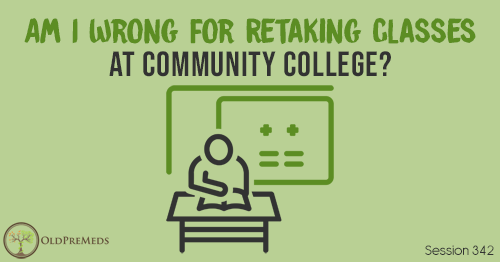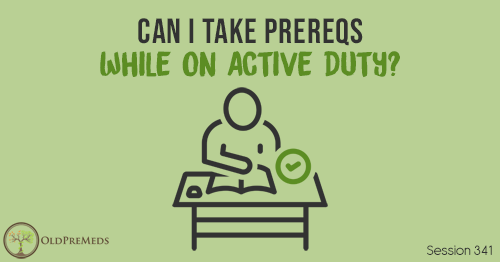Apple Podcasts | Google Podcasts
Session 276
Today’s student asked a popular question among nontrads. SMP and/or Postbac? If you have a similar question, hopefully listening to this podcast can help you.
Questions answered here on the podcast are taken directly from the Nontrad Premed Forum over at premedforums.com. Please go ahead and register for an account, ask your question, and have fun with the community.
Also, please be sure to check out all our other podcasts on Meded Media as we try to bring you as many resources as you need on this journey.
Listen to this podcast episode with the player above, or keep reading for the highlights and takeaway points.
[00:45] The MCAT Minute
The MCAT Minute is brought to you by Blueprint MCAT.
The question I get all the time is when’s the latest that I can take the MCAT? Students are trying to figure out when to register and whether they can push it back. May is typically the timeframe where July, August and September test dates are open.
Can you really take a September MCAT and still get into medical school this application cycle? Well, you can. It’s not ideal but you can.
With a September MCAT, you get your score in October. And a lot of medical schools have deadlines in and around October at least for the primary application, which is what your MCAT score is attached to.
Most schools are on a rolling admissions basis. They are constantly filling up their interview spots every single day. So the longer it takes for your primary application to be complete, which includes having your MCAT score, the lower your chances are of getting one of those interview spots.
And so, you can take a September MCAT and still get in. There’s still that chance. But my personal recommendation for the absolute latest is right around mid-July. Otherwise, it’s just a distraction at that point. Everything gets in the way of the MCAT, and the MCAT gets in the way of everything else.
So if you can take it earlier, great. If you need to wait because that’s when you’re going to be ready, that’s fine. Just understand that there are a lot of other moving pieces to this application process that you need to be on top of as well.
[03:31] OldPreMeds Question of the Week
“I graduated several years ago with a degree in Environmental Sciences with a 2.39 GPA – the cumulative and science GPA were very similar as I had taken mostly science classes. After graduating, I looked into SMPs but most of them seemed to either require the MCAT which I wasn’t prepared for or require a minimum 3.0GPA which I was nowhere near achieving. I instead began a DIY postbac and have completed 50 credits with a significant upward trend – my postbac GPA is 3.70. (my overall cumulative and science are now 2.83.)
I’d have to take an additional 30 credits getting all As in order to achieve a 3.0 cumulative/science. I recently became degree seeking in my postbac as a Biology major and actually only need 6 more credits to earn a second degree.
I was recently told by an advisor that I’m likely beating a dead horse and don’t need to continue my undergraduate studies until I get the 3.0 and that I should get a graduate degree/SMP under my belt instead. I was shocked because I had previously heard that I needed to, at minimum, meet that 3.0 mark with my cumulative undergraduate degree.
So I began cold calling many many medical schools and found only a handful admitted to automatically screening out students with a GPA lower than 3.0. I’m not sure, however, if there still might be an unspoken rule where sub 3.0 isn’t really considered.
Assuming that I don’t need to reach a 3.0, my next question is do I really need to after these 50 hours, then go on to complete an SMP in order to show that I can handle graduate level coursework?
Not only will an SMP be doubly expensive, it’s stopping me from ameliorating my application in other ways. In order to support myself financially and be able to attend school simultaneously, I’m not able to look for research experience since that’s typically during the same time as classes are held.
I’m also very strapped for time working 50+ hours a week, taking full time classes, and am not really able to volunteer, shadow during this time period. Additionally, I’m not really sure how I would fund an SMP since they’re typically grueling like the first year of med school and I likely would have to quit working or cut down significantly. Any advice is appreciated, thank you.”
[06:21] Looking at SMPs
It is a very common dilemma for nontraditional students trying to overcome early academic woes. And so, if you’re in need of great repair, what are those next steps?
For SMP programs, you have to have a minimum GPA. But isn’t that the point of an SMP program to improve your GPA?
Now, obviously, they have some minimum requirement for you to get in. They assume that if you’re below a 3.0 in this situation, then you’re likely not going to do well in the SMP. It’s a terrible assumption because there are lots of reasons why students don’t do well to begin with. You either find your passion or you find what works for you, whatever that may be – and then you do well.
“Don't apply to an SMP program that requires an MCAT in my mind completely, just it defeats the whole purpose of why you're applying to an SMP.”Click To TweetYou’re applying to an SMP because you want to improve your study habits and your understanding of the basic sciences. You apply to an SMP so you can do well on the MCAT as well as improve your GPA. And so, I don’t understand programs that require an MCAT for the SMP. It’s just a completely different tangent.
[07:46] Figuring Out Your Next Steps
At the end of the day, the question is, what do you have to do? Now, there is no right answer here.
A lot of times we talk about this 3.0 rule of thumb where if you can get a 3.0, then there’s a higher likelihood that schools aren’t going to screen you out. But we don’t really know every school that screens out below 3.0 or below a 2.0 or 2.7? It’s just this theoretical number that advisors throw out there to try to get above a 3.0 to be on the safer side.
Now, this student has done the math and 30 more credit hours is probably not worth it considering that they already have 50 credit hours at a 3.7.
'Medical schools don't only look at your final GPA numbers.'Click To TweetFor nontraditional students who are trying to do a lot of grade repair, your final numbers aren’t going to be sexy.
And so, while this student may not need an SMP. They don’t need a science master’s program outside of an SMP. There will probably be schools that are going to reject you because of your cumulative and science GPA.
But there will also be schools that don’t care about that final number. They could just ask you to show them the last 20 credit hours, or the last 40 or 60 credit hours. And there are plenty of schools that do that. The frustrating thing though is schools aren’t completely transparent about this kind of stuff.
However, I had the Director of Admissions at Noorda College of Osteopathic Medicine on The Premed Years podcast recently. And she said that they look at the last 60 credit hours, undergraduate or graduate or combined. Then I also talked to the University of Central Florida a few years ago, and they said they look at the last 20 credit hours of science. Some medical schools out there have a 32-hour rule.
At the end of the day, the question is, have you done enough in your mind to prove academic capability?
[11:23] Final Thoughts
Again, an SMP or a special master’s program is expensive and it’s a lot of time. What more is there to prove? 50 credit hours at a 3.7 is solid. Unfortunately, you got some baggage that’s holding you down from your prior undergraduate degree. And that’s just what it is. There’s nothing you can do about that now. So you just have to decide whether you’ve done enough or not. Because again, medical schools are going to give you different answers.
Have you done enough to do well on the MCAT? And if you think the answer is yes, then you’re done.
Maybe finish out that second degree, take those six more credits, get as close to 60 credits as possible, and then you’re done. Then you can go focus on the MCAT and your activities so you know what you’re getting yourself into. Focus on talking about why you want to be a doctor, your personal statement, interviews, and everywhere else.
It’s a very hard dilemma for non-traditional students who are stuck in this purgatory of GPA where you have dug yourself such a big hole in your early undergraduate work that your final numbers just don’t look good no matter what you do.
That being said, medical schools out there understand that there are students like you who are going to be amazing physicians. Because you have shown resilience, and you’ve shown determination that this is what you want, and you’ve shown academic capability.
'That upward trend means a ton and there are schools out there that look at that.'Click To TweetUltimately, just trust yourself, trust the process, and apply broadly enough and have conversations with schools if you have the time. Some schools will help you out and give you some specific feedback based on your specific situation. Advocate for yourself as you’ve done a ton of hard work already.
Links:
The Premed Years podcast












